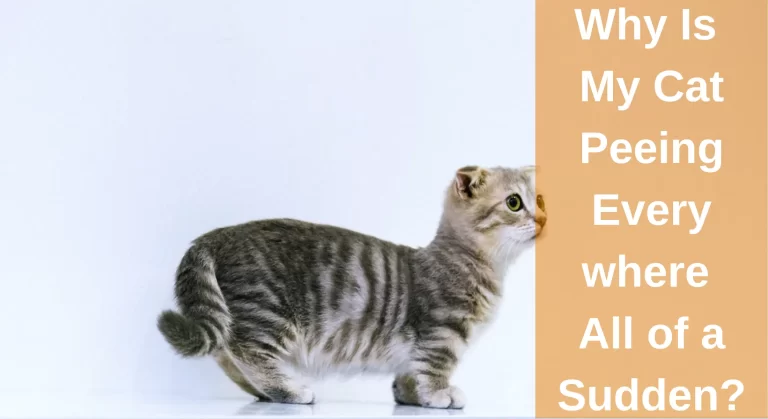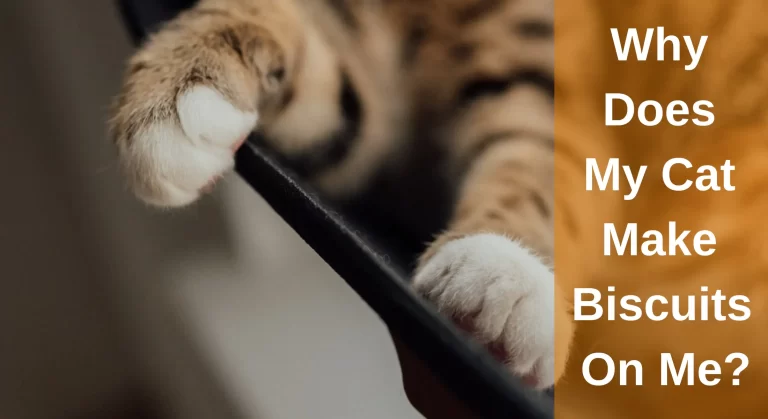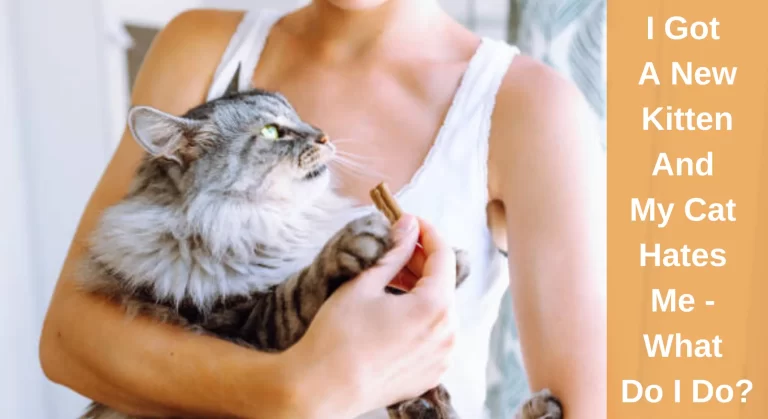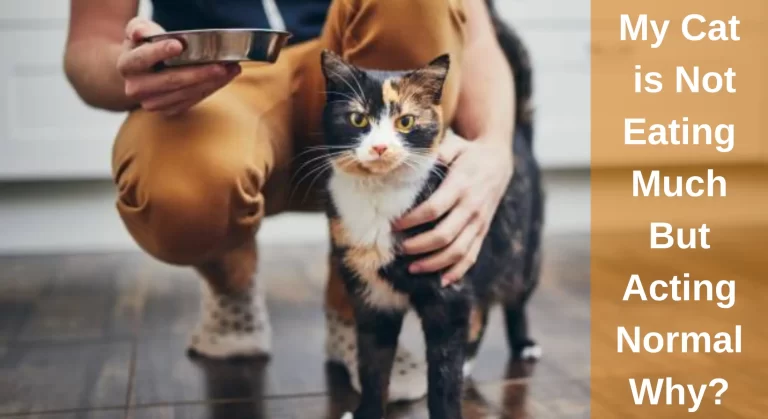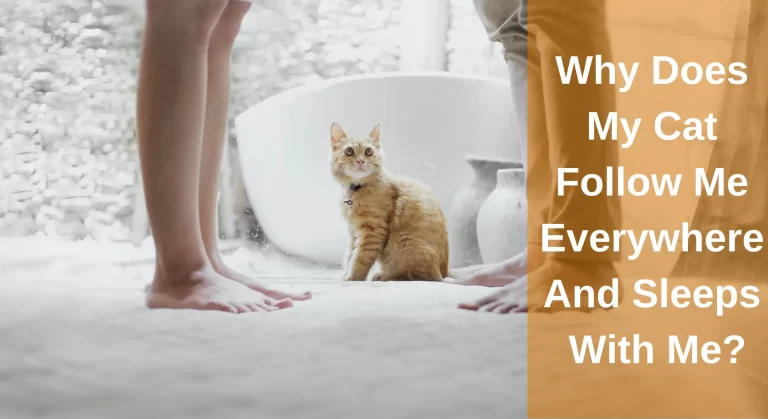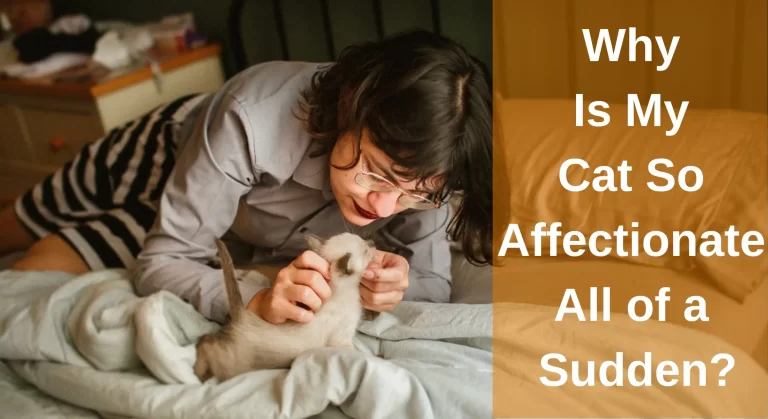Why Does My Cat Go Into Another Room And Meow? [Explained]
One of the numerous ways cats interact with us is through meowing. Being aware of frequent meowing can make your life and your cat’s life a little more comfortable. You could hear your pet cat meowing while it is in a different room, which might be worrying. Knowing a cat’s meow’s volume and pitch is crucial since different cats meow in different tones. If you are a cat owner, you must be on the lookout for those noises since a meow occasionally indicates that something is very wrong.
Did you ever question why does my cat go into another room and meow? Cats use meowing as a kind of conversation in the adjacent room. Whenever cats are thirsty, hungry, or lonely, they will meow. They may also meow if they’re hurt, sick, stressed out, or in dire need of assistance. Many cats meow in response to emotions.
If you want to uncover the mystery of Why a cat meow in a different room? Then this article might be helpful for you. Let’s start!!

Cat Meow Origin, Why Cat Meow?
Numerous animals have been domesticated during human history, which resulted in various means of intercommunication, and mutual understanding has been developed. Although cat owners praise their furry friends’ intelligence, household cats remained long neglected by academics.
Statistics show that cats have become the most popular pet in the US, outnumbering dogs by 4.6 million. The disparity appears to be much greater between European countries and Russia, where cats appear to be more popular. This preference aided research on the household cat and its enigmatic environment.

According to a researcher, what had been learned about feline vocalization was just that “the household cat represents the only part of the Felidae family that can create social interactions with people.” It’s quite astounding that the once-thought-of most apathetic animal, the pet, has developed communicative abilities to engage with us.
This becomes much more obvious if you see how cats communicate with one another. When speaking to their friends, vocalization is not a common strategy; instead, they communicate their demands and moods through body movements and smell.
To support this claim, Bradshaw states that “allorubbing and allogrooming undoubtedly serve to express and sustain togetherness in cat colonies.”
It appears that felines have evolved to coexist with people, and their use of meowing has been a key factor in this. Even if they have no language, felines have become adept at controlling humans to get the things they desire, generally meals, shelter, and perhaps a little bit of human admiration.
The taming of humankind by cats may thus be the foundation of the cats’ meow, although we still need to figure out why felines meow in a different room. Such yowling undoubtedly has a purpose because each of its meows has a specific meaning depending on the urgency of the meow sound.
Why Do Cats Meow In Another Room? Reasons Explained
Knowing what type of noises your tiny furry companion is making is crucial and useful. Naturally, no one demands cat owners to speak “cat” fluently, but having a rudimentary awareness of tones may be useful.
A new publication states that although the cat’s vocal vocabulary is diverse and can include up to 22 distinct vocalizations, it must also be evaluated in the context of other characteristics.
The significance of their meows depends on the situation, their demands, their body posture, and their attachment to humans. Hence what does the meaning of the meow that we may usually hear from some other room?

1. Serious Illness or Disease
Cats are quite skilled at concealing their physiological disease signs. They may occasionally be unwell or injured and unable to conceal it. A cat’s hunger may fluctuate due to certain illnesses, making it hungry.
Felines will meow on their owners to obtain more meals while they are starving; therefore, it is possible that the cat may meow if the sickness is changing the cat’s desire for food.
Cats seldom meow when they’re hurt; instead, they are more inclined to avoid you and remain motionless. They don’t begin to meow unless they’re attempting to be examined or treated.
2. To Seek Attention
Siamese felines are notoriously obstinate when it concerns their desire to be petted. Siamese cats have a lot to say. Most cats, particularly those that are restricted to one bedroom, are highly loud about their demand for care.
You should spend additional time with the feline, either entertaining or petting, if that is the cause of its loud meowing. Yet, you can also wish to make this different. They’ll begin to understand that meowing would grant them their wishes.
3. Ageing
Certain physical capabilities, particularly vision, start to decline as felines age. Most cats begin to lose vision with an increase in age. The additional light may not be an issue during the daytime. It may be a very different situation at nighttime or if they are alone.
Also, Check Out: Do Cats Get More Affectionate With Age?
4. Stress
Since it might easily stress out the feline or result in companion loss, this can also come under the “I’m bored” category. However, several things might lead to stressful circumstances.
The majority of these elements could be influenced by even seemingly slight changes in one’s cat’s habits or surroundings.
5. The Cat Might Need Help
Cats are notoriously naughty, running in the home and climbing on things we never knew they could do. Sometimes, cats meowing in another room also indicate that they need help. They might be in pain, grief, or some other issue due to which they’re showing this weird behaviour.
Why Do Cats Meow In Another Room At Night?
Cats are nocturnal animals, and therefore they are most active at night for the purpose of hunting. Cats still have to fulfill their innate drive for evening hunting regardless of the luxury of human houses. Cats usually sleep during the whole day and howl during the night when we decide to sleep.

Most cat owners keep their room to themselves, whereas others leave the doors locked to block out all their hunting sounds and prevent them from being awakened.
However, a potential possible cause of your cat’s howling in the late hours of the night is that the door is locked, and you are on the opposite side of that door.
Also Read: Why Does My Cat Meow at Night When I Go to Bed?
Should You Answer Your Cat’s Call(Meow)?
Loud, incessant meowing, particularly late at night, might be annoying, but the solution shouldn’t be to ignore your cat. Until, of course, you are quite certain that the feline is healthy, happy, and just meowing to obtain what they desire.

Your cat can learn not to meow in some other room if you develop a routine and adhere to it as well. You might utilize an automated food dispenser to provide them with evening snacks if it is a regular habit.
Offer them a comfy bed and plenty of toys that are tucked away about the room to keep the cat engaged. Love is the most effective strategy, even for keeping your feline friend out of your bedroom!
Don’t yell at pets; as we usually suggest, positive encouragement is the best way to teach your cat not to scream while you’re asleep.
However, if you merely own a talkative cat that enjoys meowing while they are having fun, maybe it is you who really should embrace their peculiar behaviours.
Frequently Asked Questions
Why my cat meows when I go upstairs?
Some cats have a natural tendency to attach to humans and get worried when they go upstairs. When they feel ignored, the caterwauling starts. This might be particularly true if the family moved from one house to another house.
Why does my cat meow when entering a room?
The cat meow just to say hello to you. Cats quickly discover that communication plays a significant role in human-human interaction by seeing how humans communicate with one other and with them. She’ll act just how she perceives you are doing.
Why does my cat meow when I leave the room?
Cats and their owners can have very close attachments, so cats might become distressed when left unattended. Vocalization or extreme meowing may happen whenever the cat is locked inside a different room and unable to reach you.
Why does my cat meow when no one is around?
Cats meow to seek attention, as cats can be very attached to their owners and sometimes become upset when left alone. They can be quite vocal about their needs; whether it’s stroking, playing, or simply talking, the cat may want your attention.
Why does my cat randomly meow?
An interesting way to communicate is by meowing. Cats meow for various reasons, such as to welcome us, request things, and tell us when something is wrong.
Why do cats meow at nothing?
If your cat meows excessively, it may be due to hunger, fear, sickness, or a desire to play. It may also be due to boredom or a need for your attention.
Wrap Up!
A cat usually meows whenever it enters a separate room for a variety of reasons, from funny to more worrisome, such as illness or stress. Usually, feline meows will indeed be accompanied by additional symptoms when there is a problem.
Therefore, don’t wait until additional symptoms appear before going to the veterinarian. It’s always best to keep them safe; therefore, take cats to the veterinarian as quickly as you can if you are concerned.
Related Articles:
- Why Does My Cat Meow at the Door?
- Why Does My Cat Meow When I Sneeze?
- My Cat Keeps Meowing And Rubbing Against Everything
- My Cats Meow is Weak and Raspy – Why And How to Help?
- Why Does My Cat Meow Loudly After Using the Litter Box?
- Why is My Cat Drinking a Lot of Water and Meowing?
- Why Does My Pregnant Cat Keeps Meowing?
Who is Isabella?
My name is Isabella, and I am a dedicated and knowledgeable cat enthusiast. With years of experience caring for cats and a deep love for felines, I made a mission to help other cat lovers navigate the challenges of cat ownership.

